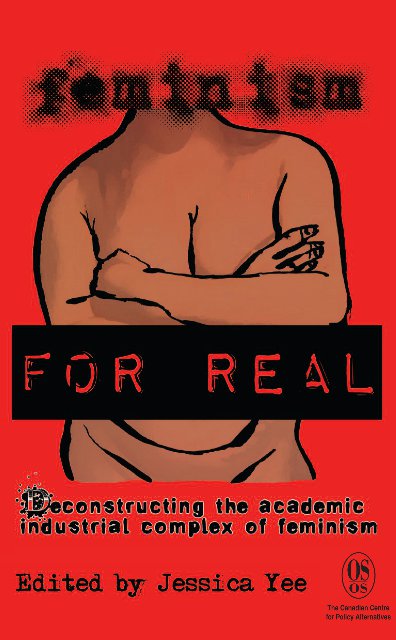What is a feminist?
Is a feminist an academic who can quote bell hooks and Betty Friedan with ease? Is a feminist a great orator who steps up to podiums, demanding freedom for all women, using buzzwords such as marginalization, empowerment and exploitation? Is a feminist white, benefitting from class privilege and well-versed in feminist theory, as the representation in last week’s highly criticized CBC documentary The F Word might suggest? Or is being a feminist simply antiquated, as columnist Margaret Wente declares “The war for women’s rights is over. And we won.“
Editor Jessica Yee and the contributors to her new anthology, Feminism FOR REAL: Deconstructing the Academic Industrial Complex of Feminism argue that none of these descriptions accurately define a feminist. Instead, many feminists who fight for rights every day are voiceless within mainstream an academic feminism, including single mothers who fight upward battles to provide their families with food and the many women “who have taught us everything we know about feminism, without ever labelling themselves as such.”
In her introduction, Yee argues that “feminism itself has become its own form of oppression,” that many feel alienated from. “I’m constantly questioning what feminism is, and I’m increasingly disturbed every day at the gate-keeping of who and what gets to decide the answer to that question,” she writes.
In her own words, Yee is a “Two Spirit, multi-racial, Indigenous, hip-hop feminist, reproductive-justice freedom fighter.” She is the founder and Executive Director of the Native Youth Sexual Health Network, and though she doesn’t fancy herself a writer, she is a contributor to racialicious.com, Bitch, and here at rabble.ca. Feminism FOR REAL has been published by the Canadian Centre for Policy Alternatives.
Each of the contributors in Feminism FOR REAL share their own — often unsettling — truths, revealing the ways in which they have felt alienated and oppressed within mainstream feminism and academia. Yee makes it clear in her introduction that the book is not a “hate-on of academia” or a “hate-on of feminism,” rather it seeks to break down the limited reach of an academic industrial complex of feminism that contributors call passive, theoretical, classist and deeply alienating — to name only a few. In her essay, called “Maybe I’m not Class-Mobile; Maybe I’m Class-Queer,” contributor Megan Lee says she was “met with slight-of-hand, apologist pandering, and dismissal,” at the academic institution she attended.
Feminism FOR REAL provides a positive space for many talented young writers – whose genres vary from prose, to poetry, to dialogue — to share their very-personal stories. Among the contributors are 16-year-old Nimikii Couchie of loon clan from Nipissing First Nation, whose poetry is raw and wise beyond her years, and Shabiki Crane who witnessed enough racism and other barriers within a women’s studies program that she concluded “feminism (in academia) just seems like another place where there is no room for me.”
The anthology closes with a piece by academic Kate Klein called “On Learning How Not to Be An Asshole Academic Feminist,” where she recalls “having [her] activist spirit virtually beaten out of [her] in the classroom.” “All I can hope for in the work that I do is to attempt to kick a couple of stones into that gap between the academy and the community and listen to them rattle around until they hit the bottom, hopefully contributing just a little bit to filling the gap,” she writes.
The greatest success of Feminism FOR REAL is that it is void of the academic jargon that is typical of many so-called feminist texts, which seem only accessible with PhDs in Women’s Studies. It puts real stories and real people in the spotlight, not theory and rhetoric. It will undoubtedly encourage all readers to question and redefine what feminism means to them.—Jessica Rose



